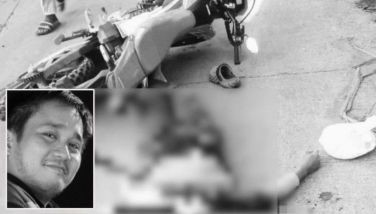Rapist has ‘50-50 chance’ of being spared from execution
July 12, 2002 | 12:00am
The rape convict scheduled to undergo lethal injection on Oct. 16 has a very slim chance of being spared, Justice Secretary Hernando Perez said yesterday.
"It’s 50-50," Perez told reporters when asked what chances convict Alfredo Nardo has that his execution would not push through.
He, however, said President Arroyo may still go "soft" on convicted rapists since her only hardline policy is against sparing convicted kidnappers — who continuously prey on Chinese-Filipino families — from the death chamber.
The President initially expressed her dissent on capital punishment as a means to deter crimes, but stressed that she supports the execution of kidnappers because of the unabated kidnappings in the country.
Perez noted that of the 17 convicts scheduled for lethal injection this year, 15 are rapists, mostly meted death for incest. Only two — Roderick Licayan and Roberto Lara — were kidnappers.
If ever, Nardo will be the first convict to be executed under the Arroyo administration, and the eighth since the term of jailed former President Joseph Estrada, who approved the execution of four rapists and three cop-killers.
Nardo was not supposed to be the first death convict scheduled for execution since the Supreme Court first upheld the death sentence on fellow rapist Rolando Pagdayawon, but the Legazpi City court which convicted Nardo came ahead first with its schedule.
The High Court upheld with finality Nardo’s death sentence in April 2001, thus making him eligible for lethal injection anytime from today to October this year.
Under the law, the execution of a death convict cannot be carried out a year after the sentence has become final. But Article 18 of Republic Act 7659, or the Heinous Crimes Law, provides that the date of execution should not exceed 18 months from the time the death sentence has become final.
Records of the Bureau of Corrections show that 17 death convicts, including Nardo, are due for execution this year.
Pagdayawon was convicted by the Davao City Regional Trial Court, whose ruling the Supreme Court upheld with finality in March 2001. The court, however, has yet to schedule his execution. Under the law, he can be executed anytime from March to September this year.
"It’s 50-50," Perez told reporters when asked what chances convict Alfredo Nardo has that his execution would not push through.
He, however, said President Arroyo may still go "soft" on convicted rapists since her only hardline policy is against sparing convicted kidnappers — who continuously prey on Chinese-Filipino families — from the death chamber.
The President initially expressed her dissent on capital punishment as a means to deter crimes, but stressed that she supports the execution of kidnappers because of the unabated kidnappings in the country.
Perez noted that of the 17 convicts scheduled for lethal injection this year, 15 are rapists, mostly meted death for incest. Only two — Roderick Licayan and Roberto Lara — were kidnappers.
If ever, Nardo will be the first convict to be executed under the Arroyo administration, and the eighth since the term of jailed former President Joseph Estrada, who approved the execution of four rapists and three cop-killers.
Nardo was not supposed to be the first death convict scheduled for execution since the Supreme Court first upheld the death sentence on fellow rapist Rolando Pagdayawon, but the Legazpi City court which convicted Nardo came ahead first with its schedule.
The High Court upheld with finality Nardo’s death sentence in April 2001, thus making him eligible for lethal injection anytime from today to October this year.
Under the law, the execution of a death convict cannot be carried out a year after the sentence has become final. But Article 18 of Republic Act 7659, or the Heinous Crimes Law, provides that the date of execution should not exceed 18 months from the time the death sentence has become final.
Records of the Bureau of Corrections show that 17 death convicts, including Nardo, are due for execution this year.
Pagdayawon was convicted by the Davao City Regional Trial Court, whose ruling the Supreme Court upheld with finality in March 2001. The court, however, has yet to schedule his execution. Under the law, he can be executed anytime from March to September this year.
BrandSpace Articles
<
>
- Latest
- Trending
Trending
Latest
Trending
Latest
Recommended



























